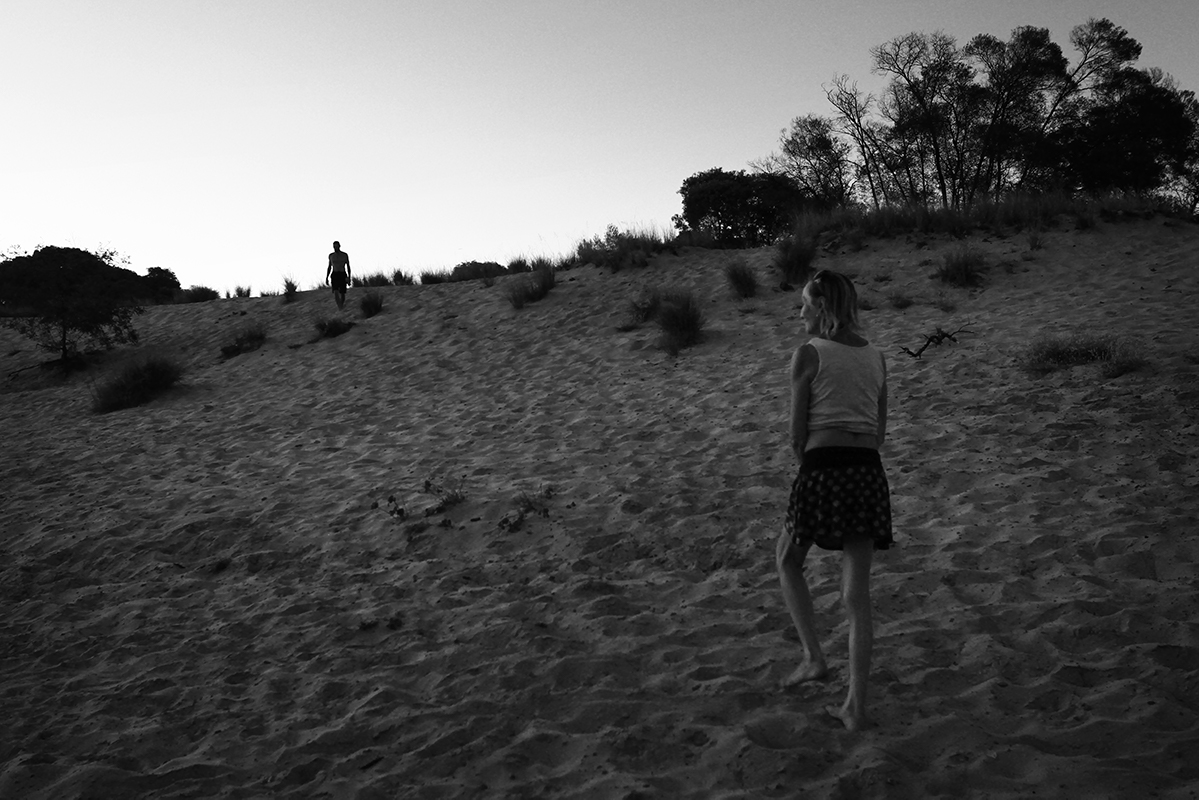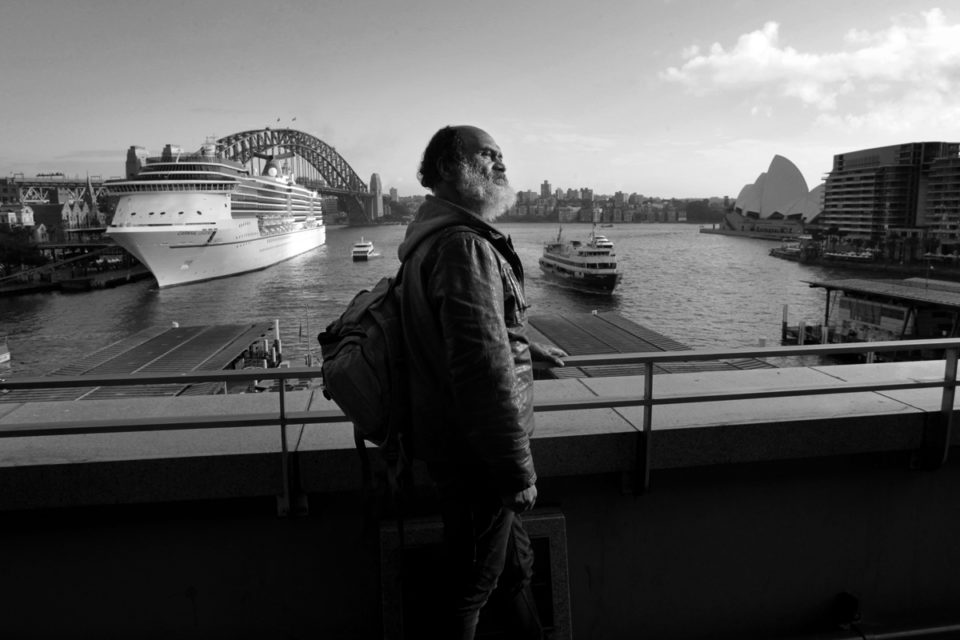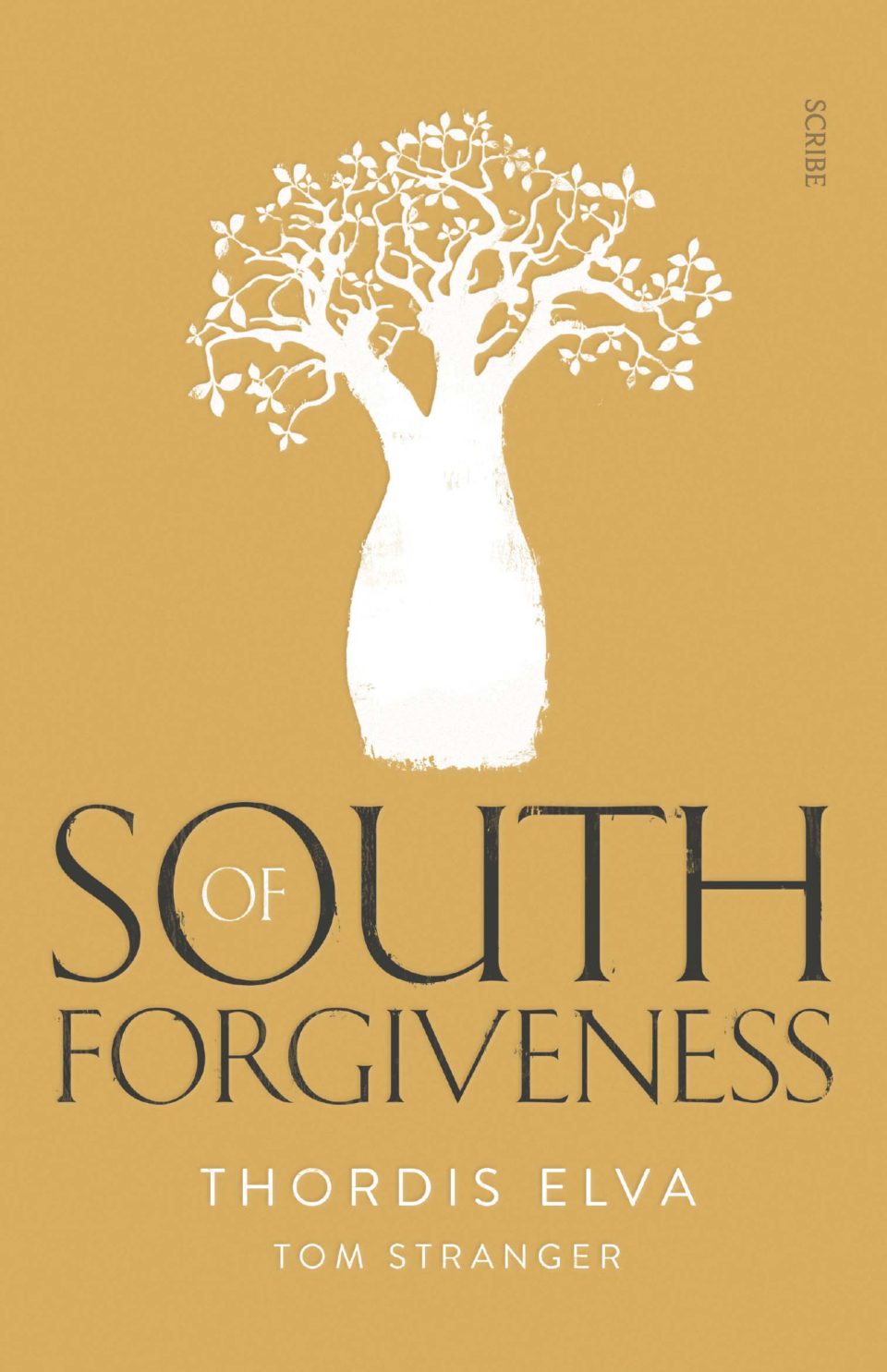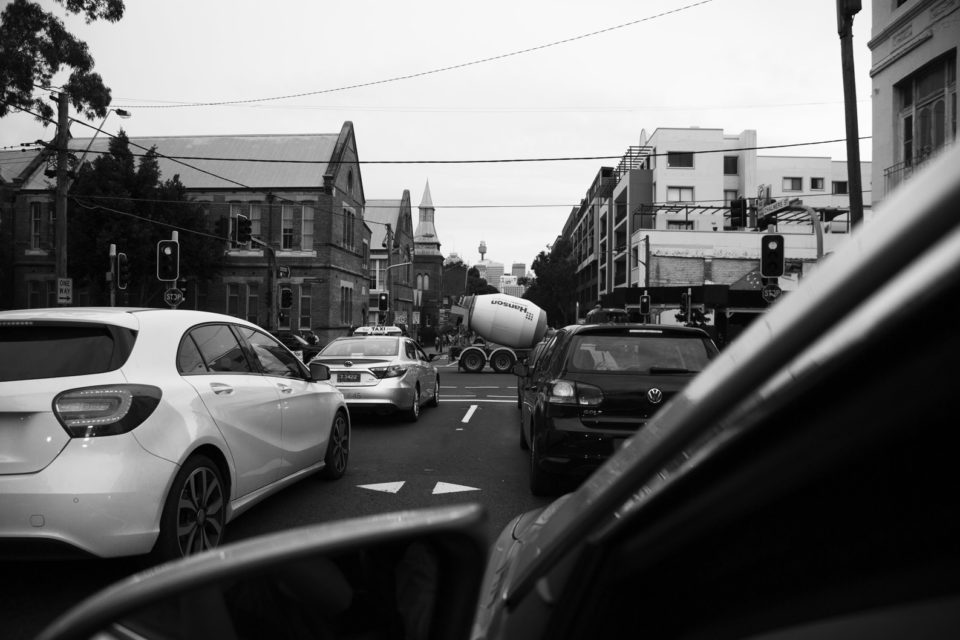About 40 people are scattered around the Hawkesbury Helping Hands van, sitting at picnic tables waiting for food to be served. Most are men, just a few women. All are gaunt and middle-aged or older, dressed in an assortment of op-shop discards. It’s unseasonably hot for this time of year, but thunder is threatening to the west. Tough weather to live in without benefit of air con or a roof. Soon enough, winter will create a whole new set of challenges.
Linda Strickland has about five conversations on the go as she bustles about. Hawkesbury Helping Hands is the service she set up to deal with a rising tide of homelessness in the Windsor and the Hawkesbury region. She seems to know everyone here by name and receives two marriage proposals tonight, once the burgers and salad are served.
The Hawkesbury and Nepean Rivers virtually encircle Sydney. City-dwellers associating homelessness with CBD street sleepers might only know these rivers from weekend house-boating or fishing trips. But anecdotally there are thousands of homeless people living in secluded enclaves from Windsor through Ebenezer and on to Wisemans Ferry, down south to Penrith.
“It’s impossible to figure out how many people are sleeping rough, d’yaknowotimean?” Linda says. “You can never get the true count because the Hawkesbury is so big and there’s so many places where they’re hidden away.”
She points out subtle distinctions amongst the diners: “Rough sleepers over there, car dwellers over here. On that other bench, by the river bank, that’s our long term campers. On a weekend that’d be full of kids. A car is one step up from a rough sleeper, although a lot of the people living in cars would say it was bad… Depending on the weather, it’s brutal.
“Those people there with the shopping trolley full of stuff are newcomers,” Linda says. The newcomers – a ravaged, skinny blonde woman, a short, confused-looking man with a withered arm, and another older man – sit apart from everyone, smoking.
“We set them up last night with a tent and they slept in the park.”
I sit down with two other men as they finish eating. Dave’s about 40, but he seems weary, older. Kimbo looks ancient, with a pale bushranger’s beard discoloured by tobacco and the elements. Dave starts talking to me about his hidden campsite by the river when Kimbo hands me a small note pad. On it he’s written:
LIVED ON THE RIVER FOR 18 YEARS.
WE WAS KNOWN AS THE SUNSHINE CLUB.
That’s when I notice the hole in Kimbo’s throat and realise he can’t talk.
We’re interrupted by another river-dweller, Wendy, an anxious, barefoot woman eager to help. She asks Dave, “Can we have a chat about these new people? We’re thinking about putting them in Steve’s old camp.” Dave nods thoughtfully.
Kimbo passes me another note.
WE DOIN A FUNDRAISER BBQ FOR LINDA NEXT WEEK.
That’s an interesting wrinkle. The homeless helping their helper.
I’m hoping for more information but Kimbo vanishes – and Dave and Wendy are engaged in the more pressing business of getting the newcomers a campsite.
Linda bustles over to me. “Those three new people, they’re not in a very good way. I’ve asked Dave and Kimbo to look for a good camping spot but first we’ve got to transport their gear.”

Dumped and burnt, Hawkesbury River 2018. Photography by Dean Sewell.
Linda started her vocation seven years ago. She had a shop in Windsor selling the hundred pairs of cowboy boots she’d collected while living in Texas.
“One night the dogs went crazy and we looked out the window. There was a guy going through our garbage bin. I went outside and asked him ‘do you want a sandwich?’ but he ran away. That was my first in-your-face experience of homelessness, because they’re mostly hidden around here.”
Linda and her daughter began volunteering at a local soup kitchen. “It was closed on weekends so we said to everybody, ‘Meet us in the park on Saturday.’ The first Saturday we had seven people, now we have up to 80, sometimes 100.”
Mother and daughter had been at it for four months before a local journalist asked what they were called. Linda improvised the name – Hawkesbury Helping Hands. It stuck. “We had no idea in those days – we’re a tiny grassroots organisation but our community is huge, the largest area of Sydney.”
Their first year was tough. They were feeding people with their own money and donations from the local community.
“From mid-December to mid-January, nearly every service shuts down on the Hawkesbury but us, so we’re up to 10-15 hampers a day and amongst all that we do a free Christmas Day lunch. So till mid-January it’s a lot of work and little sleep. We run a breakfast club for kids and take lunches to the local high school five days a week.”
Over the past two years, Linda’s noticed a steep increase in people coming to meal services. “A lot of people can’t afford to have electricity on. How are they supposed to cook or have a shower? The rents are absolute murder. A one bedroom flat is $250 a week. If you’re a single mum it doesn’t matter how many kids you’ve got, you’re still gonna find it tough.”
As the lunchers start to disperse, Linda begins packing her van, still talking to people, asking pointed questions about living conditions, handing out brochures for specialist services.
“I would say 25 per cent of the people that come here are the working poor,” she tells me. “Living paycheck-to-paycheck. Once they’ve paid rent and bills, they’ve got nothing. We have a lot of single mothers. People think they’re all uneducated. But I’ve had women solicitors living in their cars coming to meal services, single women sleeping in cars in my backyard.
“Food is our priority. We’re not funded so we can’t do accommodation, but one thing we can do is make sure they have food, toilets and a safe place to be and if they have nothing we can give them a tent or a swag.”
Photographer Dean Sewell has been co-opted to drive the three new arrivals across the river to the unofficial camping grounds. Linda offers me a lift to meet them.
Her van is overflowing with boxes of food. I’m balancing trays of pavlova on my knee as we pull up in a car park alongside the wide, brown river.
“There’s been people living on the river bank here forever,” says Linda. “Aboriginal people, convicts. There’s caves up in the mountains where I’ve heard people have been camping for years.”
Linda takes off, late for a meeting.
It’s sweltering as I walk across the grassy river flats. Orchards are shimmering to the west, storm clouds leaning testily on the mountains. I can see Dean’s ute, people gathered round another vehicle. Beyond them a jungle of weeds, willows and wattle.
Kimbo’s brought a ride-on mower, on a trailer hauled by his battered Statesman sedan. Dave’s underneath the mower, trying to release the drive belt to start the machine. Finally he climbs out, shaking his head.
“The whole frame’s cracked,” Dave says.
Kimbo’s leaning on the trailer. A hoarse rattle issues from his throat. I see him wiping blood from the hole.
The three newcomers are standing by Dean’s car, looking warily at the thick bushland. Later it’s explained to me that DK has a form of cerebral palsy, a withered arm and a speech impediment. The older man is deaf. Preteena smokes cigarettes intently, as if she’s fighting rising panic. They all look as if they’ve endured some unspeakable trauma.
Dave and Kimbo show them one potential campsite, but DK looks unconvinced. The grass is very thick and there’s debris left by a previous camper – old tents and household rubbish. It’s a snake’s paradise.
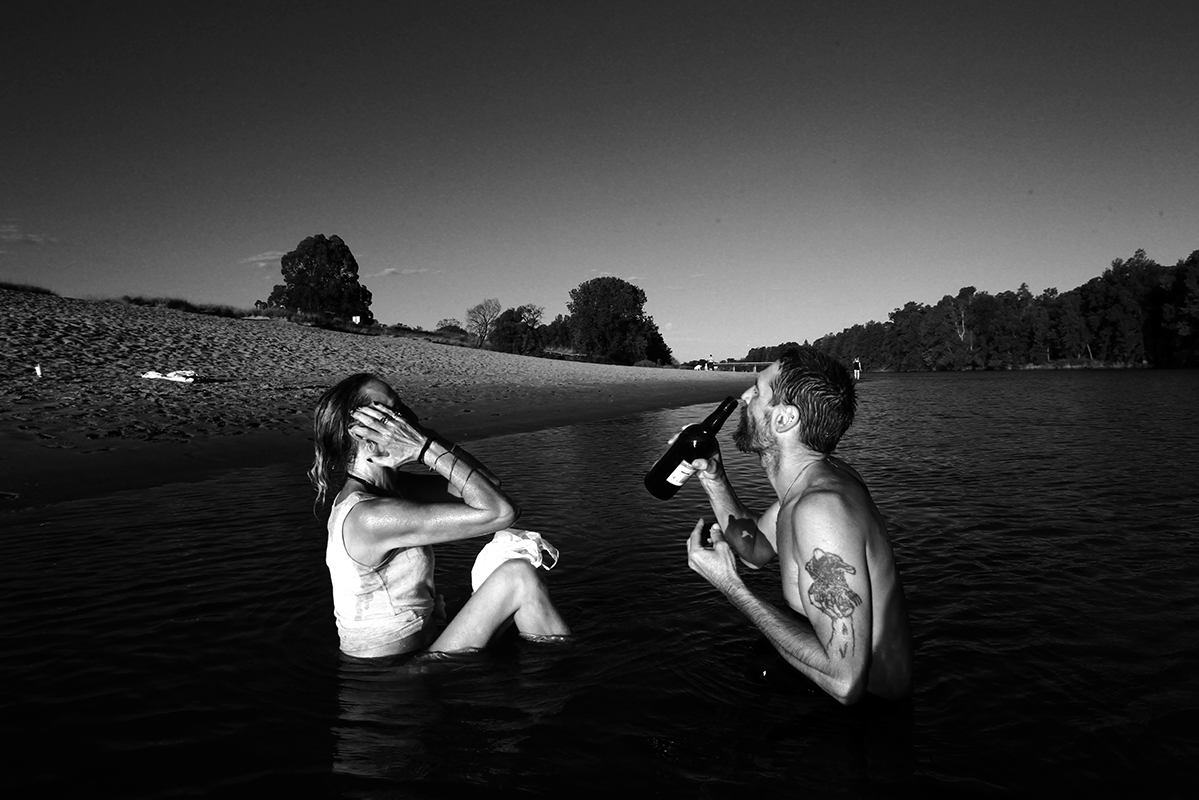
Preteena and Dave bathe in the Hawkesbury River. Photography by Dean Sewell.
A burly bloke with few teeth and a loud voice strolls up. He’s carrying a golf buggy. He lives further along the river in an enclave of campers that’s been described as ‘rough’.
I ask if anyone swims in the river on hot days. The burly bloke chuckles through a mouth devoid of teeth.
“Some people do. I wouldn’t swim in it myself. All that crap coming off the turf farms and orange orchards and everywhere else.”
He points back towards some thick scrub. “Somewhere over there would be good for a camp,” he says, pointing into the thick scrub where we came from. “You don’t want to bring ‘em any further up here. Steve might get a bit funny if they get too close to his camp and he has a few beers.”
Meanwhile, Wendy arrives, barefoot again, and invites everyone to her place for a drink of cordial, but nobody responds. Her husband Robert suffers from dementia. Robert is able to drive their car but can’t engage in conversation. The couple sleep in the car with their small one-eyed dog, Winky.
Dean and I end up visiting Wendy and Robert’s nearby camp. It’s a sprawling mess, dominated by an old caravan. Stacks of hoarded materials, many shrouded in tarpaulins. Sagging tents are full with Wendy’s damaged and weather-worn goods.
Living without toilets or showers in those strangely crowded conditions cannot be pleasant. But Wendy puts a brave face on it. She fishes out tarps, ropes, cups and plates and says she’ll take them over to the newcomers.
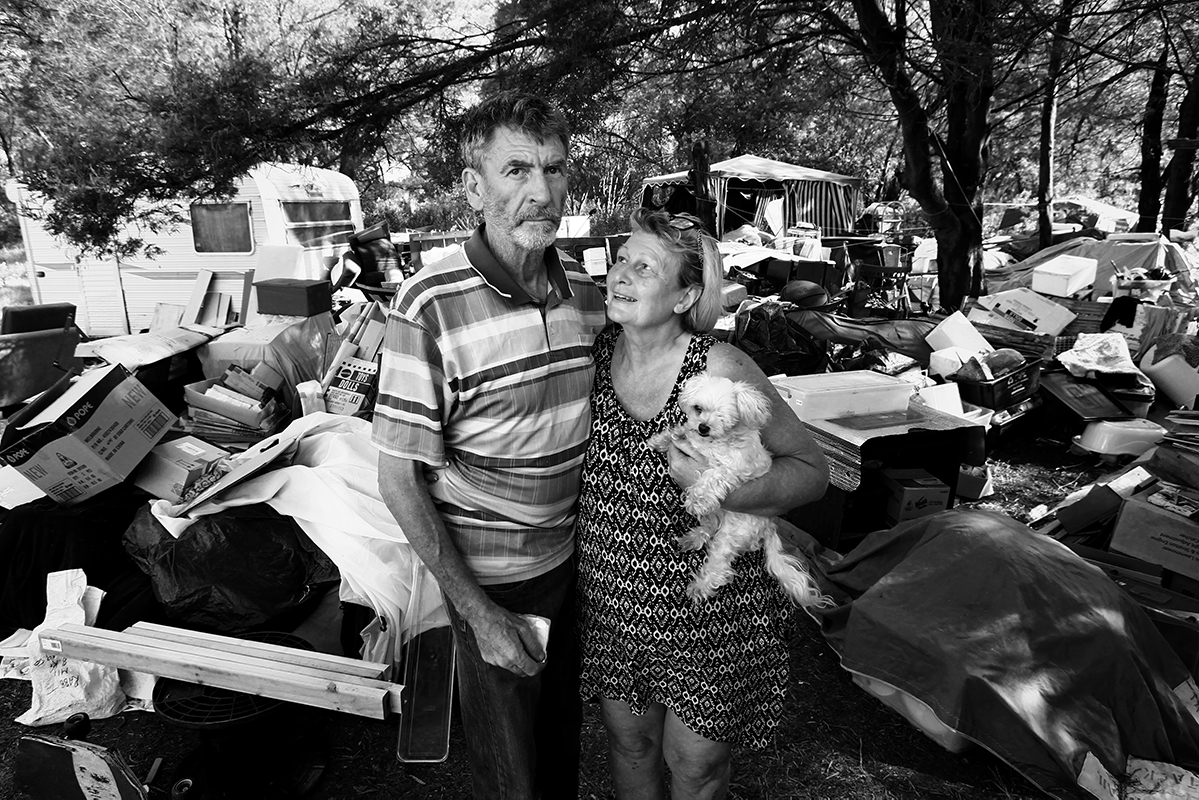
Robert, Wendy and Winky at their camp. Photography by Dean Sewell.
Dave selects a site deep inside the forest. It’s all burrs, wasps, flies and heat, abated somewhat by the sweet smell of fennel, which grows in abundance. Kimbo is despatched into town to fetch a new mower.
A qualified chef, a landscaper and welder, Dave describes himself as “an outdoors person”, which is handy as he lives on the river-bank with a cockatiel parrot.
“I’m from New Zealand, but I’d been living here for 16 years when I had my divorce,” he says. “When we split up she got everything, I got the bills. I had nowhere to go, so I came up and got a job concreting in Windsor. I saved up ten grand and bought a boat in Rose Bay. I was living in it till it sunk on Australia Day, so the second time round I came back here and got some welding work for a while.
“I was doing ok, paying child support for two kids, then the work closed down. I was due to get a tax return of five grand, then there was a child support over-assessment, so now I owe them eight grand. I’m only getting $375 a fortnight and I owe $20,000 from my marriage. I gave up my dodgy caravan, I was paying $220 a week for that. I lost my passport and had my wallet stolen, so now I’ve got no ID. Then every day was a nightmare looking for somewhere to live. In the end I just gave up and slept in the park.
“Being on benefits is not the bludge it’s made out to be. If you miss a job provider appointment you get suspended. If you don’t have money for an Opal card how do you get there? It’s catch 22. You’ve gotta jump through hoops just to get paid, it’s kind of a job on its own.
“I used to see homeless people and think well, get a job, now I see it’s not that easy.”
Dave doesn’t smile much, but he says living on the river isn’t too bad.
“Everything’s close by. It’s a lot quieter than the city, cheaper living, but it’s hard to find a job. It does get cold in the winter, but you’ve got the library to sit in. There are people living in abandoned places, those that are on the streets never sleep.”
When Kimbo returns with a functional mower, they start carving a pathway into the long grass. It’s hot work. Dave’s pushing the machine while Kimbo peers over the steering wheel, dodging tree stumps and old tyres.
Finally they iron out a flat spot with some shade. They’re followed tentatively by DK, Preteena and the older fellow – I never discovered his name – clutching their bags and the tents that Linda gave them from Hawkesbury Helping Hands.
“The snakes aren’t so bad,” says Dave. “I see one every now and then but I don’t mind ‘em. As long as they don’t get my bird.”
Thunder is rattling and a cool wind washes in through the trees. It commences to rain.
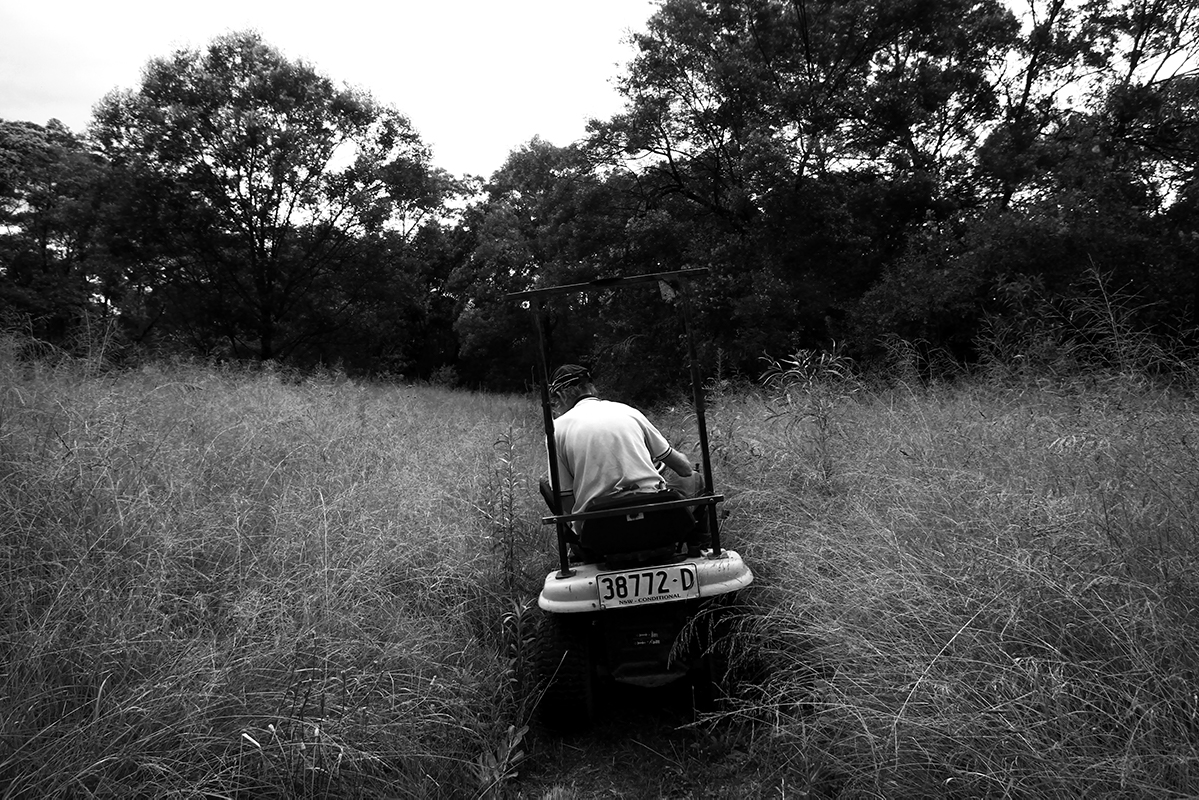
Kimbo on his lawnmower. Photography by Dean Sewell.
A week later, at the fundraising BBQ in Richmond’s industrial suburb, Dave, Kimbo and Preteena are sitting in a large jury-rigged marquee in the stifling heat, waiting for customers. Preteena looks more relaxed, but her thin, pinched face speaks of more than one improvised exodus from hard times.
This lot, full of old machinery and a shipping container is the headquarters of Kimbo’s lawn-mowing business. It’s across the road from a dance academy where young girls in tutus are giggling. The RAAF base is up the road and Caribous occasionally roar overhead.
Kimbo’s proudly showing off his mowers in various states of repair. He reckons he has seven ride-ons and 30-40 push mowers. Dean and I buy rissoles on a roll for $3.50, cans of cold drink for $2. Dave starts cooking on one of three large commercial BBQs.
Kimbo passes me another of his notes:
I HELD A SHIT CART EVENT TO RAISE MONEYS.
TROTTING SPIDER WITH W/C CAN ERECTED ON IT. STIPULATION 2 HAD PUSH 2 PULL
He’s got several notepads bought in bulk. He claims to have started a radio station in Windsor, presumably before he had throat cancer. It’s not clear where Kimbo lives, but he reckons he’s got plenty of mowing work.
After we’ve eaten a silence descends on the BBQ. Dave’s scraping fat off the hot plate. He shows phone pictures of his campsite and the tiki bar effect he’s created, complete with flower arrangements and posters.
“I wanna build a little cordwood house just on the turf,” he muses. “No foundations in the ground. Council wouldn’t like that. I’d like to open my own business, but I’ve got so much debt from my marriage I can’t get a loan. What do you do?
“Homelessness is not about sitting around all day drinking alcohol and smoking cigarettes. It’s stressful and it’s hard to get out of. It’s a vicious circle. You think you’re getting ahead and something happens and you fall back again, and you say to yourself, why bother? Why do I try?”
No customers show up to the barbeque.
When photographer Dean and I return a few weeks later things have changed dramatically. No-one’s home but the newcomer’s camp is well established with tents and tarps, a leveled floor, gardens and trenches to mitigate the recent heavy rains. The kitchen has a table, benches and shelves made from pallets. Cacti and basil planted in the garden.
There’s even a rickety gate. I recognise Dave’s handiwork. Having moved in to this camp, he and Preteena are in a relationship.
There’s a well-worn track to Wendy’s camp. Her hoardings have grown. Two more gazebos are pitched out the front of the old caravan, amid growing piles of damp paraphernalia. She’s been texting Dean with increasing desperation, asking him to come and help her out as she’s become isolated from the group. She blames Preteena.
As we’re waiting in the hot sun their car pulls up. Wendy emerges in a faded dress. “Oh thank goodness you’ve come. I’m just exhausted. I desperately need help.”
She’s looks tired, close to tears. There are scratches on her arms and legs. She’s clutching Winky like a life preserver. We say hello to Robert and he looks like he’s going to say something, but nothing comes out.
The recent heavy rains have exploded the undergrowth. Weeds and acacias hide jeering choruses of crickets, cicadas and frogs. Most of Wendy’s hoardings are covered in tarps, like a Christo exhibit.
“I know it must look scary from the outside,” she says. “But it’s all stuff I want to have in my house. I still envisage having a life one day.”
Wendy says she owns a house in town but had to leave it because Robert, increasingly ragged with dementia, kept locking them out. They have a daughter with autism who seems to have made a life elsewhere. She wants to sell the house, but it too is overflowing with compulsively acquired material. As are her three industrial containers on the edge of the common, visible from this campsite.
Wendy asks us to help her empty water out of roof bulges in one of the gazebos, propped above what seems to be the A grade rubbish. She demonstrates how to adjust the plastic jerrycans of water the guy ropes are tied to, in order to tension them. Then we’re shifting boxes of things around on a makeshift platform of pallets. Toys, chairs, prams, mouldy books, boxes full of empty boxes. Fishing rods, mattresses, rusted tins of food, a complete aluminum camping set of pots and pans.
She knows the provenance of every item. Her rambling commentary finds a laser focus if anything catches our attention. “That’s a vintage motorised fridge. The motor’s missing and of course it would need power.” She points out some rolls of dirty material in between tumbledown pallets. “That’s top quality commercial vinyl and carpet tiles I’m going to put on the pallets. I want to make a nice space for Robert to sit in out of the sun.”
Anything we do is purely cosmetic and makes no difference to the overwhelming mountains of junk, but our labours seem to make Wendy happy.
Robert watches silently, scratching his head.
Winky is scrabbling through the weeds. A rustle in the long grass announces what could be a snake. I wonder how long this little one-eyed dog will survive this jungle.
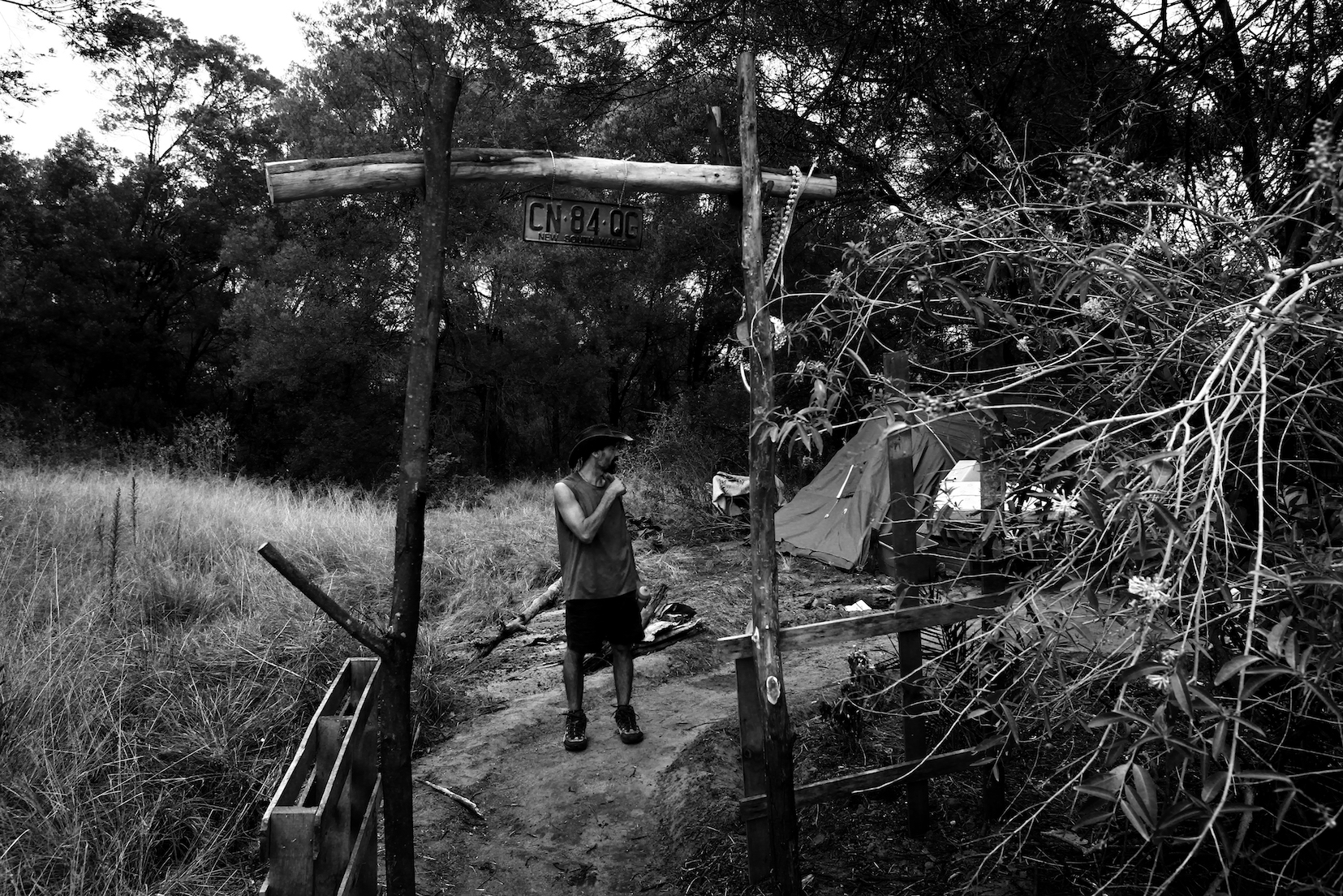
The newcomer camp. Dave considers home improvements. Photography by Dean Sewell.
We tell Wendy we’ll come back in the morning to put up a new gazebo and walk back through the bush to the other camp. Dave’s sitting on a couch smoking. His bird is sitting too quietly in its cage.
“There’s something wrong with her [the parrot],” he says. “She’s usually singing and dancing about.”
Preteena phones him. She and DK are on the train to Windsor from Blacktown. Dean agrees to go pick them up. Dave talks about one of his business ventures. He used to weld sculptures out of steel tubing and sell them till his ex-wife threw them, and him, out.
He talks about ‘booting’, a computing term for kicking someone out of a chat room. I find it difficult to equate Dave’s CV as a welder and concreter with a secret life as a hacker, but he seems to be describing coding protocols that require a lot of expert knowledge.
“I used to build websites. If someone didn’t pay in the time agreed I had my own back door code to get in and disable the website. Only had to use it twice.”
He’s enthusiastic about pooling his money with Preteena and DK to rent a house. “Then I can get a job and get my shit together.”
Later, Dean, Preteena and DK arrive back loaded down with groceries. They’ve got lots of food from various charities and a stack of plastic cups from a Scientologist’s stall near Blacktown station. Preteena greets me warmly, like I’m an old friend.
DK gives a guarded look and ignores me.
One of DK’s occupations is begging in town. It’s a practice known as ‘coal-picking’. He’s been involved (unromantically) with Preteena a long time. From what I can gather he took the responsibility for some crime they’d both been involved in and he did jail time.
Seeing Preteena take up with Dave had prompted a competitive spirit in DK and he’d asked her to marry him. She rejected him.
Preteena tells me she’s suffering from both schizophrenia and cancer. She’s certainly had a hard life. She was kicked out of home by an abusive father in a small Queensland country town at age 14. She’s been raped several times and suffered other unspecified abuses.
But Preteena’s tough, a survivor. She’s raised six children and is very proud that the father of some of them is an Aboriginal man. She takes a kind of fierce, malignant joy out of living against the grain of a judgemental system.
“I’m a chef like Dave. He’s not the only one who can cook,” she claims, in a bellicose squawk. Turns out she’s been a shearer’s cook, working big sheds in Queensland. But she’s not cooking tonight. Tonight she wants to party.
She sits at the other end of the couch from Dave. They’re both drinking cask wine out of sports drink bottles. He keeps bringing the talk around to houses he’s seen in the paper, real estate agents he’s talked to. Preteena isn’t interested.
Everything’s too expensive.
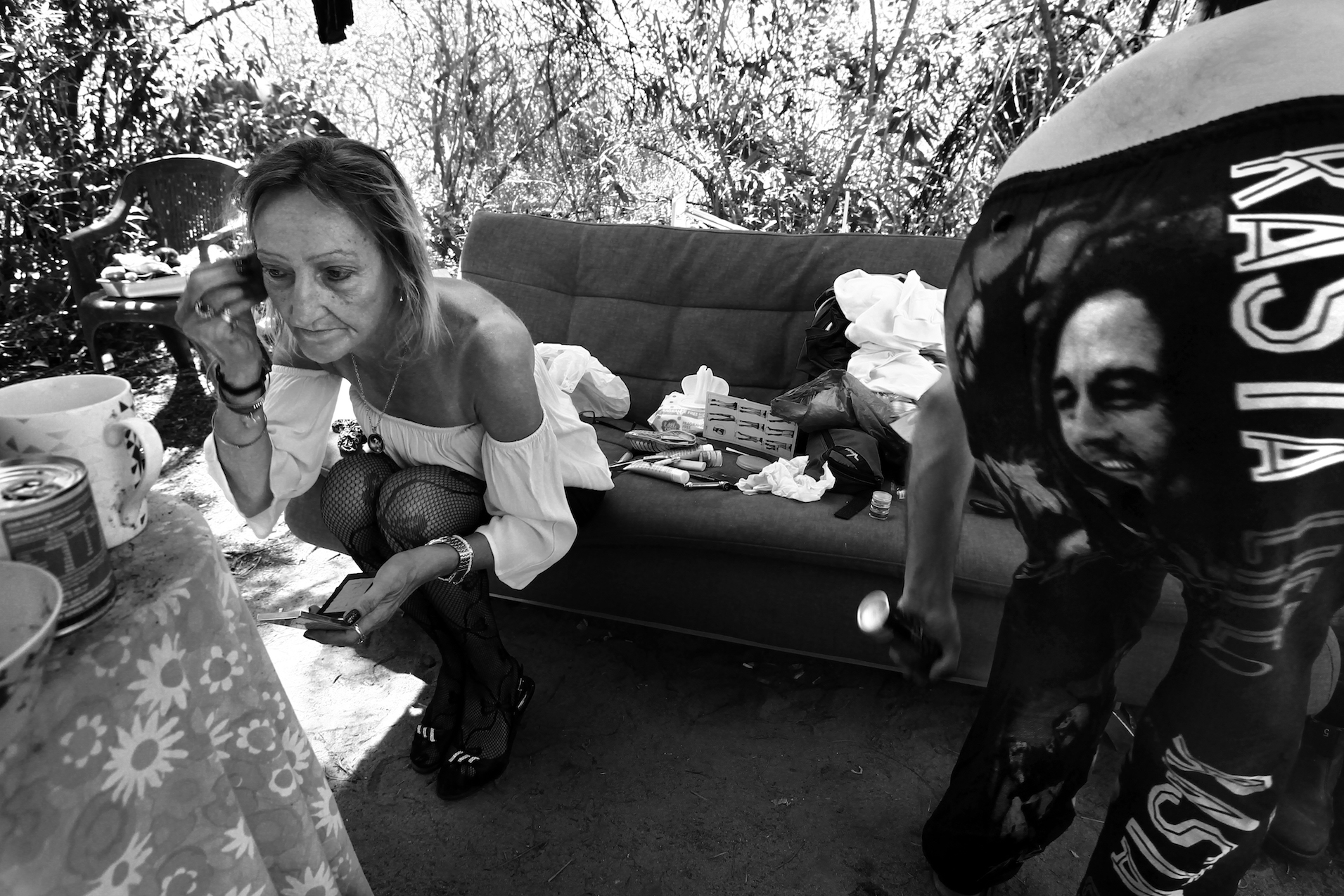
Preteena. Photography by Dean Sewell.
She’d rather talk about who she’s seen in town. Her stepson, “a real bad-boy”, made an appearance briefly, before being recognised by the police and scarpering. Somehow she’d spent $700 today. The blame for this is increasingly, it seems, being laid at DK’s feet, though Dave, inadvertently, is responsible too.
“You cunts owe me money!” she growls. “Yers have both been sayin’ ‘lend me money, I’ll pay ya back’.”
“I get paid tomorrow Preteena. Give us another cone,” DK demands.
“You fucken better. I’ve only got twenty dollars left out of seven hundred.”
Wendy can be heard, howling and sobbing in her camp. To drown out the noise DK has a radio tuned, loudly, to a local radio station playing ’80s hits. It inspires Preteena to reminisce on a recent triumph.
“Did you see the photos Dean took of me before the Mardi Gras? Gawd, I’ve never had my photos taken like that before. He got me to face this way and turn that way, get the best light an’ that. I was all dressed up in me stockings and mini skirt.”
They’d taken the train to Strathfield, but that’s as far as they got. Dave bought a bottle of whisky and Preteena had her own Mardi Gras, commuters gawking as she prowled the platform, giving a raunchy exhibition in her sheer stockings, g-string and short skirt.
“I wasn’t afraid. I had my boys with me.”
During the night the camp has two other visitors, both men in their 60s. They work and sleep rough further along the river. Both comment on the noise coming from Wendy’s camp. Preteena’s personality changes remarkably, becoming effusive. She makes them cups of coffee and butters bread for a snack. It’d be easy to believe she was a stabilising influence in this camp, but for the relapse into character the minute they’re gone.
We can still hear Wendy caterwauling. Occasionally Preteena hollers “shutup ya mad bitch!” As it’s getting dark Wendy comes down the path, arm-in-arm with the tottering Robert. Preteena goes to her in a show of solidarity. Wendy recoils. She demands to know why she’s being reviled and ignored. DK is at the gate telling Wendy to go.
Eventually Wendy alludes to Preteena’s ailments. “She hasn’t got cancer,” she says. “She’s just smokes too much pot.”
Dave loses his temper at that.
“Fuck off!” he bellows.
Wendy retreats howling, dragging Robert with her.
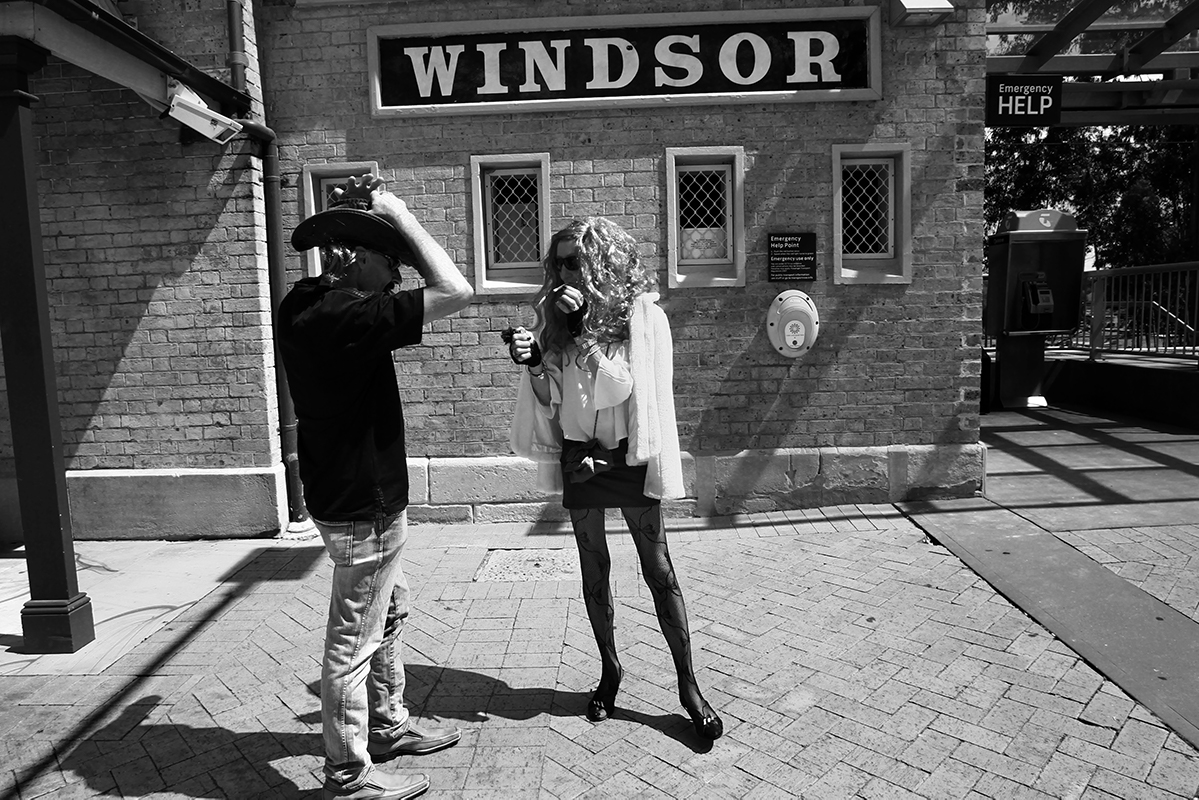
Dave and Preteena at Windsor Station on Mardi Gras day, 2018. Photography by Dean Sewell.
With the night seeming to slow down, Dean and I stretch out on swags. But we can hear Preteena getting drunker and more argumentative. “I want my fucken money. You cunts owe me 700 dollars!”
DK goes to his tent, still playing the radio; ‘Africa’ by Toto to drown out Preteena’s profane croaking. Dave has words with him and Preteena starts screaming. Wendy, too has started howling again in the distance. This sets the tone for the next several hours.
Eventually Preteena concludes that DK stole the money.
“I’m callin’ the cops!” she screams.
Soon the policeman on the other end of her phone call is trying to get a fix on her position, but her explanation is crazed, incomprehensible. She hangs up.
“See? You better run DK, or you’re goin’ back to jail.”
“That’s it, I’m goin’ to my mum’s,” shouts DK.
He makes it to the gate, the first of many times. But DK is psychologically tethered by a trauma bond so elastic that he constantly ricochets back to the camp, for more rounds of incoherent recriminations.
The night dissolves into an endless cycle of bickering. About 3am I crawl off into Dean’s truck. At dawn he wakes me and we walk about 500 metres to the river.
“The other morning I got talking to a woman exercising her horse,” says Dean. “I told her what I was doing and she had no idea homeless people were even camped here.”
Back in the scrub at the other camp, Wendy and Robert are up. They have no working stove to make a cup of tea. Wendy has barely slept and is incoherent, her long rambling stories going nowhere.
Dean starts moving boxes off a platform in a vague effort to help out. I pull a tarp from a basket to reveal a sodden mess of old clothes.
“That’s washing,” Wendy exclaims. “I haven’t got to that yet.”
“Every day is exhausting looking after Robert,” she confides. “He’s very difficult because he has these inertia traits, so everything you try to do he refuses to help and he’ll be wandering around behind me telling me that I can’t do it either.”
We can still hear screaming and shouting coming from Preteena’s camp.
“It never stops,” Wendy sobs, collapsing hysterically in the long grass. Roberts stands expressionless above her, staring into the white noise of crickets and cicadas. Pulling herself together, Wendy hands us a box of parts to erect another gazebo. When we come to the last pole in the roofing section, it’s not there.
“Where did you buy this Wendy?” asks Dean.
“I got it secondhand from Gumtree. All the pieces are there.”
She sorts through them carefully. Finally she’s forced to admit that the gazebo can’t be built, till she’s found the missing piece.
That’s it. We have to go. As we’re leaving Wendy leans into the car, crying.
“I don’t know what to do,” she cries. “Those people are crazy. I’m afraid. Robert can’t do anything to protect me. He used to be a rehab counselor. He was very good at his job, very empathic. Now he can’t even give me a hug with any oomph in it.
“I was a trauma counsellor too. Our plan was to run our own counseling service from here. Robert used to have a poem above his desk, by a Christian missionary called CT Studd.”
She recites from it from memory:
“Some want to live within the sound
Of church or chapel bell;
I want to run a rescue shop,
Within a yard of hell.”
We leave Wendy tearfully waving goodbye from her fortress of junk. We can still hear Dave, Preetena and DK from the other camp, screaming at each other. Only Dave’s bird has been silent, all night long.
Welcome to the Sunshine Club.
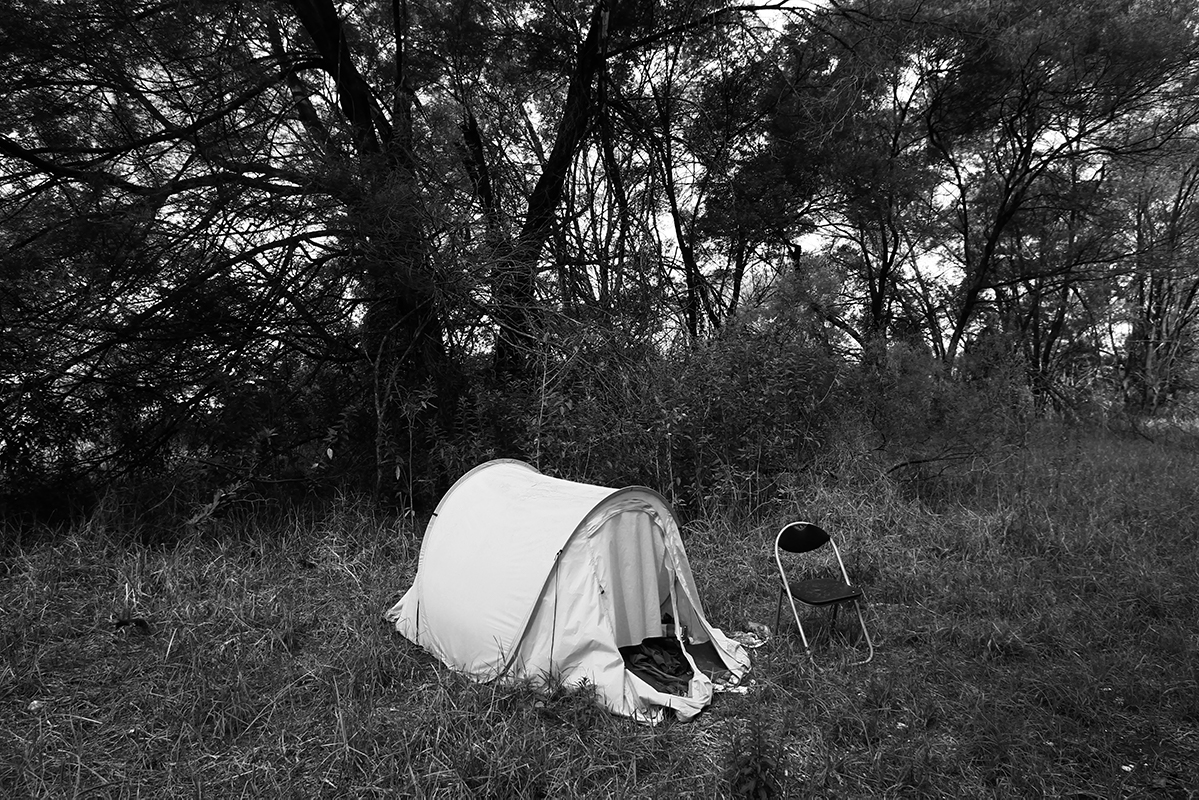
A tent is a home. Photography by Dean Sewell.
ABS stats released in March this year show a 37 per cent increase in homelessness in NSW in the five years leading up to 2018. As homeless people are by definition unlikely to have received a census form, the figure of 57 homeless people given for Windsor seems hopeful at best.
In the camps around the Hawkesbury that photographer Dean Sewell and I visited we met many vulnerable, damaged people, going under from mental illness and society’s inexorably high cost of living. They’re not starving, but they’re bereft of the security and hope most people of this privileged nation take for granted. There are more of them every day.



